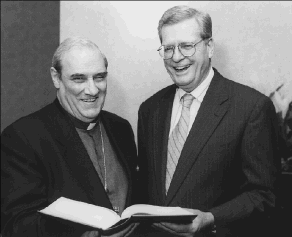
    |
 |
|
by Anna Bratulic
"You have to be a little bit of a monk to be involved in something like this," said Cardinal Jean-Claude Turcotte in admiration, motioning toward a blue-covered book as thick as a telephone directory.
The "monk" in this case would be Theology Professor Sean McEvenue, who edited the Old Testament section of the more-than-1,900-page International Bible Commentary. The book is a collection of critical articles contributed by selected biblical scholars from 32 countries.
A copy of the newly published book was presented to Cardinal Turcotte by Rector Frederick Lowy at a wine and cheese reception held in the Henry F. Hall Building on January 18. McEvenue, who will retire at the end of the term, was praised for his work by university officials, colleagues and the Cardinal. Former Quebec premier Claude Ryan also attended.
 For eight years, McEvenue sifted through the contributions of scholars from
many countries, and often called for rewrites before he was satisfied with the
result. Although it is intended mainly for those who work professionally with
the Bible, the book's clear style and lack of jargon makes it accessible to a
wide readership.
For eight years, McEvenue sifted through the contributions of scholars from
many countries, and often called for rewrites before he was satisfied with the
result. Although it is intended mainly for those who work professionally with
the Bible, the book's clear style and lack of jargon makes it accessible to a
wide readership.
However, McEvenue said that it is not a substitute for reading the Bible itself. "The Commentary is not intended to say, ever, what the Bible says, because it can't," McEvenue said. The articles are reflections and analyses to support one's own reading and understanding of biblical text.
What makes this book different is its departure from traditional bible study. Biblical scholarship of the past 200 years has followed the historical-critical method, placing the Bible in its historical context. By uncovering what was going on politically and culturally during the writing of a book of the Bible, scholars feel they are better able to deduce the real meaning of the text.
However, many of the original authors are unknown, and the century in which they wrote uncertain. In some cases, the books are a compilation of the writings of several authors from different periods. What interpretative guidance can be drawn from historical context in such cases?
"As the history of this material advances, there's a lot less clarity about what that history really is," McEvenue said. Assuming that the only meaning of the text is the meaning it originally had does not take into account the interpretation implicit in all the books of the Bible, namely the continuity in our experience of God through the centuries.
Professor Pamela Bright, Chair of Theological Studies, also participated in the writing and research for the Commentary over the past five years, along with her husband, Dr. Charles Kannengiesser. She feels that the Bible would more correctly be understood if scholars thought of it as a "living text."
"[Some other modern biblical scholars] don't ask what this text has meant through 2,000 years of history. All books are living, in the sense that they are always speaking to the generation that reads them."
The International Bible Commentary is available in English (The Liturgical Press) and in Spanish. It is scheduled to be published in other languages, including French and Italian. The editor is William R. Farmer, professor emeritus of New Testament at Perkins School of Theology, in Dallas.



